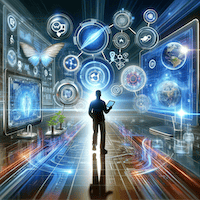The future of digital marketing for agencies is continuously evolving, with new technologies and strategies reshaping how agencies operate and deliver value to their clients. The future of digital marketing for agencies is expected to be driven by advancements in technology, changing consumer behaviors, and an increased emphasis on data-driven decisions.
Embracing Artificial Intelligence and Machine Learning
Artificial intelligence (AI) and machine learning (ML) are at the forefront of this transformation. Agencies are increasingly leveraging AI to gain insights from big data, allowing for more targeted and personalized marketing strategies. Machine learning algorithms can analyze consumer behavior patterns, enabling agencies to predict trends and adapt their strategies accordingly.
For instance, AI-driven tools can optimize ad spending by identifying the most effective channels and times to reach target audiences. Additionally, AI can enhance customer experience through chatbots and personalized content, providing a more engaging and responsive interaction with brands.
Harvard Business Review discusses the role of AI in transforming marketing strategies, highlighting its potential to revolutionize how agencies approach data and customer engagement.
The Rise of Virtual and Augmented Reality
Virtual Reality (VR) and Augmented Reality (AR) are set to play a significant role in the future of digital marketing. These technologies offer immersive experiences, creating new opportunities for brand engagement and storytelling. Agencies can use VR and AR to create interactive campaigns, allowing consumers to experience products or services in a virtual environment.
This immersive technology not only enhances user experience but also provides agencies with valuable data on user interactions and preferences. Brands can leverage this data to refine their marketing strategies and create more personalized experiences.
Prioritizing Sustainability and Ethical Marketing
Sustainability and ethical considerations are becoming increasingly important in digital marketing. Consumers are more aware of environmental and social issues, and they expect brands to demonstrate responsibility and transparency. Agencies must adapt by incorporating sustainable practices and ethical messaging into their digital marketing strategies.
This shift not only responds to consumer demands but also aligns with broader societal goals of reducing environmental impact and promoting social good. Agencies that embrace sustainability and ethical marketing can differentiate themselves and build stronger relationships with their clients and their audiences.
World Advertising Research Center (WARC) provides insights into why sustainability matters in marketing and how it can be effectively integrated into digital strategies.
Conclusion
The future of digital marketing for agencies is dynamic and promising, marked by technological advancements, immersive experiences, and a focus on sustainability and ethics. By staying ahead of these trends and adapting to the changing digital landscape, agencies can position themselves as leaders in innovation and client engagement.

